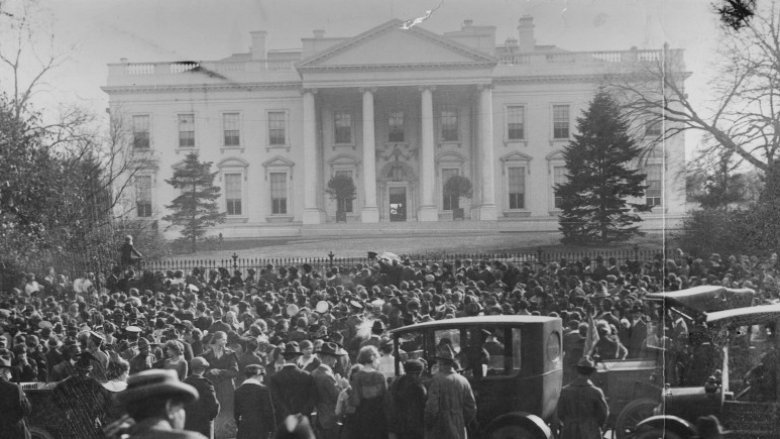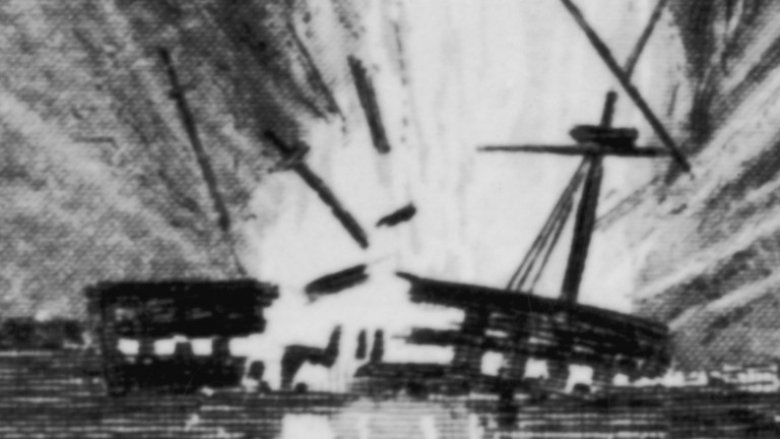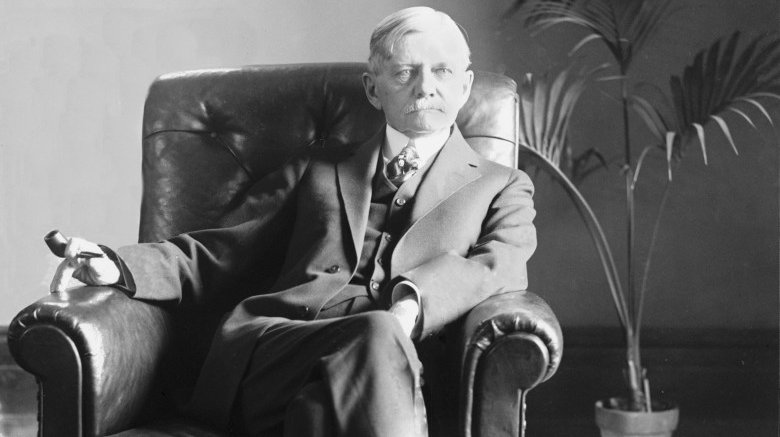People You Never Knew Were Almost President
Becoming president of the United States is a pretty simple process. You just have to register, be stupid-rich, and be prepared to do and say absolutely anything to be elected. Or, something goofy could happen to the president and then BOOM, you got a job. That's because, throughout the history of the U.S., there have been occasions where someone you never heard of almost became the most powerful person in the country. The following "what if" scenarios all came dangerously close to happening and altering the entire course of the country.
Benjamin Wade
If Benjamin Wade isn't a name that leaps to the top of your head, your slacker self obviously haven't memorized every President Pro Tempore. Poor George Poindexter, we hardly knew ya!
In most of the 19th century, the United States line of Succession had the President Pro Tempore — which is usually the senior Senate member from the ruling party — as second in line, only behind the Vice President. The Speaker of the House presently sits second, with the President Pro Tempore at third. In the case of no Vice President, that would move everyone up a spot. Under today's rules that wouldn't happen anymore — a new Vice President is nominated and approved/disapproved by Congress — but in the 1800s, if a Vice President died or elevated to President, there would be no new veep.
Enter Andrew Johnson, the accidental President after Lincoln caught a bullet with his head. Johnson had no VP, so sitting second was Benjamin Wade, the President Pro Tempore. Congress impeached Johnson, mainly because he acted like a king and did what he wanted, and among those voting to get rid of Johnson was Wade himself. Johnson survived impeachment by only one vote — that's how close Ben Wade came to becoming President. He went as far as picking a cabinet — talk about putting the cart before the horse.
Funnily enough, Johnson may have remained because people detested Wade just so much. He was a radical Republican, and wanted to punish the South even more than Johnson did. Had Wade elevated to President, he would likely have been in for a surprise. Chief Justice Salmon Chase hated him so much, he wrote a special oath to make sure Wade swore to be "acting President," rather than full-on Prez. Never Today's politicians can't even approach that level of petty.
William Rufus Devane King
You have probably heard the name William Rufus Devane King, since he was likely the first-ever gay Vice President. Andrew Jackson, known as one of those tough guys that today we'd call a bully, called him "Miss Fancy" — to be fair, King was more Rip Taylor than Rip Torn. He also came within a whisker of becoming President.
After the death of his uncle, President-elect Franklin Pierce and family attended the funeral in Andover, MA. On the train ride back to New Hampshire, tragedy struck. Barely into their return trip, an axle broke and the train derailed. The President-elect grabbed his wife, seated next to him, and reached in vain for his 11-year-old son, Benny. As the train came to a rest on its roof, Pierce and his wife saw the horror: the back of Benny's head "sheared off," and their only child dead.
Benny was the third of the Pierce's children to perish, and the boys' death put a somber tone on the entire presidency, but Franklin came perilously close to death in that train as well. Had Pierce tumbled out of his seat he would have suffered the same fate as Benny, and King would be President Fancy.
David Rice Atchison
So let's just say that Franklin Pierce had tragically perished in the train derailment that killed his son. Even though Pierce was not sworn in, the electoral college vote already occurred, so he was in line to be the next President. That would mean that William Rufus Devane King would be President, as we mentioned earlier. But it would have been a short-lived Presidency.
See, King had tuberculous, and his appointment to VP was more of a lifetime achievement award. King was so sick, he didn't even attend the inauguration in Washington D.C. — he was in Cuba and was actually sworn in there, making him the only VP to be sworn in outside of the States. King died a little over a month after the inauguration, meaning President King likely would've gone down as yet another William Henry Harrison. Now, under those rules of the time, the President Pro Tempore became President. If that happened, David Rice Atchison is President. Again.
Why again? Well, if you know Atchison's name it's through a little foible where he was actually President for a day ... from a certain point of view. Zachary Taylor's 1849 inauguration fell on a Sunday, and Old Rough and Ready refused to work on the Lord's Day. So, technically, Atchison was President that Sunday, because he was President Pro Tempore then as well. That is really a lot of bunk (the old President is still President until the new guy gets sworn in) so he wasn't really President, but in 1853, in the above disastrous scenario, he most certainly would have been.
Funny thing is, he wasn't a whole lot different than Pierce — they were both pro-slavery Democrats, and Atchison was so gung-ho about this, he actually resigned his Senate seat to lead pro-slavery forces into Kansas to intimidate anti-slavery settlers. Pierce was a pretty bad President, but if that train had been just a little bit meaner, we would've ended up with someone far, far worse.
John C Breckinridge
In January 1857 — remember that, in those days, the inauguration was in March — President-elect James Buchanan arrived at the National Hotel in Washington D.C., just in time to get violently ill. 35 people also got sick and Representative John Quitman of Mississippi died a year later, having never recovered fully. Raw sewage is the official culprit, but speculation remains that it was an attempt to poison the incoming President. That would have left duties to John C. Breckinridge, his 36-year-old Vice President.
If you think Breckinridge would have done a little better job holding the country together than Buchanan, because just about anybody would've been better, um ... probably not. After losing in the 1860 Election (to some guy named Lincoln), Breckinridge jumped ship to the Confederacy and served as a brigadier general. Buchanan was no great President, but at least he remained in the Union during the war.
Willie P Mangum
William Henry Harrison is famous for dying. After 30 days on the job, Harrison let pneumonia get the best of him, and he became the first President to die in office. That put John Tyler in office, which was bad for his Whig party, because he was hated by his own cabinet. Tyler had a rough run of it, but not as bad as a boat ride one night.
In 1844, Tyler boarded the Princeton, a steam frigate. After firing a large cannon twice in honor of the President, the Secretary of War asked for one more blast as the vessel approached Mount Vernon, in honor of George Washington. He'd been dead for 45 years, but whatever. Against his better wishes, the captain obliged, and fired. Tyler already saw the thing go off twice so he was already on his way up a ladder when the cannon exploded, killing six. If Tyler really liked things that go boom, we would have been in a conundrum. Tyler had no Vice President, so the job would fall to President Pro Tempore Willie P. Mangum. People already didn't accept Tyler as President — he returned any letters that addressed him as "acting President." How would they feel about Mangum? Acting-acting-president? Had Tyler perished, the entire ascendancy of the President could have been altered forever.
John Nance Garner
After trouncing the sitting President in the 1932 election, Franklin Delano Roosevelt went on a victory tour of sorts, touting his ideas to jumpstart an ailing America. During a speech in Miami, an out-of-work bricklayer decided that FDR wasn't the answer after all. Giuseppe Zangara opened fire as the President-elect sat in the back of a convertible; FDR narrowly escaped being hit, but Chicago mayor Anton Cermak died from a gunshot wound.
At the time, FDR chose John Nance Garner to be his Vice President. Garner initially supported FDR's New Deal to spark the country but, by their second term, he soured on FDR. There's no way to tell, had Zangara hit Roosevelt, if Garner would have implemented FDR's plans, but he certainly wouldn't have kept them in place as they faltered. Would the country have even survived a Depression where the New Deal became a Dead Deal? Magic 8-Ball says, "probably not."
Garrett Hobart
You've never heard of Garret Hobart. It's OK, his ancestors probably forgive you. The press called Hobart "assistant President," and he was undoubtedly the most powerful VP ever at that point. When you think of a modern veep actually assisting the President, that's because of Hobart. The only reason you never hear him mentioned on any "greatest VP" lists is no one remembers him. Partially because he was Vice President (any of you know Levi Morton or Thomas Hendricks? Didn't think so), but also because he died unexpectedly of a heart ailment, at the end of his first term of office.
So how does a dead guy almost become President? Undoubtedly, his President would have chosen him to run on the ticket again but, due to his untimely death, William McKinley needed a new running mate. At the 1900 Republican primary, he allowed the party to choose his running mate — they picked Theodore Roosevelt by acclimation. McKinley, as we know, would be assassinated months later. Hobart was lock-step with McKinley in domestic affairs — in other words, he was nothing like Roosevelt, so the post-McKInley era would've been way different than what we got. Ol' Teddy may have gotten his shot at the big chair eventually (no way does someone that badass get denied forever), but it was someone else's bum ticker that first got him close.
Adlai Stevenson
Adlai Stevenson came very close to becoming President, but it's possible no one even told him. Stevenson hopped aboard Grover Cleveland's second run for the Presidency in 1892, playing second-fiddle to Cleveland should something happen.
Something happened. Cleveland developed a lump on the roof of his mouth, and later learned it was cancer. He worried what the news would do to Wall Street — the President with cancer, egads! — and decided to keep it quiet. How quiet? Surgery on a boat that no one knew about for 24 years quiet. The story actually leaked shortly after the surgery, but the President denied it — presumably by tweeting out "Fake News!" — and it wasn't until the chief surgeon admitted it decades later did the public know. For that matter, Stevenson didn't know either. There's no real evidence that Stevenson knew he was one botched surgery away from moving into the White House. That would be the king of unexpected promotions.
Thomas Marshall
If anyone truly should have been President, it's Thomas Marshall. Marshall served eight years under Woodrow Wilson, which means he was right there when Wilson had a stroke. Wilson came very close to death, including a urinary tract infection shortly after the stroke that almost killed him. We now know that Woodrow's wife Edith, didn't want Woodrow to resign, so she kept everyone, including his cabinet, in the dark about his true condition, kinda running the show on her own after his stroke.
So why didn't the Wilsons just let Thomas Marshall take over? Simple — Woodrow thought Marshall was a moron. In his defense, Woodrow thought everyone was a moron. Wilson so disrespected Marshall that the veep just stopped showing up at meetings — if he did, he didn't even bother to speak. And it wasn't because he was bad at his job — it's just that Marshall was witty, outgoing, and accepting, while Wilson was a book nerd and a racist. Edith kept Woodrow's condition secret from Marshall because she knew the truth — Marshall absolutely should have been President.
Hannibal Hamlin
There's a lot of "would've could've should've" in American history, but nothing compares to Hannibal Hamlin. Abraham Lincoln chose Hamlin as his Vice President in 1860. The two weren't exactly buddy-buddy, and you could make the case — despite what Steven Spielberg told you — that Hamlin was more anti-slavery than Honest Abe.
As a former Senator, Hamlin was used to yielding power — 19th century Vice Presidents didn't do that. He wasn't thrilled with his veep position but, at the same time, he grew to gain the respect of Lincoln. Abraham invited him to discuss the Emancipation Proclamation, something Hamlin long pushed for. So why'd we get Johnson and not Hamlin post-Booth? Well, when Lincoln came up for re-election, he wasn't a very popular guy. Knowing it would be a tight race, Abe played politics. As a native of Maine, Hamlin's home state was safely in Lincoln's pocket. What he really needed was border states, like Tennessee. So for political reasons, Lincoln dropped Hamlin for Andrew Johnson, the War Governor of Tennessee, setting up ... well, you know the rest of the story. Johnson was an utter failure as President, even getting impeached.
But pump the breaks for a minute there. Hamlin was a Radical Republican — that's not radical like what everybody said in the '80s, but radical as in "let's punish the living snot out of the South." Johnson's actions were not great by any stretch — he actually did a lot of harm to freedmen — but the radicals were so ... radical, there's no telling how the South would react to their unfiltered plans. There is one thing for certain — Hamlin would have expedited the freedmen's acclimation into society a lot better than Johnson did. Plus, how cool would've it been to have a president named Hannibal? What's more American than a chicken in every pot, served with a side of fava beans and a nice chianti?


